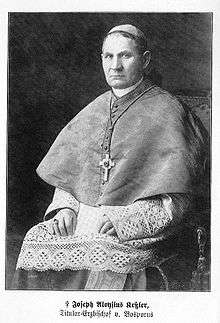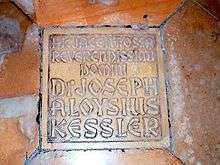Josef Alois Kessler
Joseph Aloysius Kessler (German: Josef Alois Kessler, Russian: Иосиф Алоиз Кесслер; August 12, 1862 – December 10, 1933) was the last bishop of the Diocese of Tiraspol (Russia) and the last Volga German bishop till Bishop Joseph Werth, SJ.
Joseph Aloysius Kessler | |
|---|---|
| Archbishop | |
 | |
| Church | Roman Catholic Church |
| See | Roman Catholic Diocese of Tiraspol (Russia) |
| In office | 1904-1918 |
| Predecessor | Eduard Baron von der Ropp |
| Successor | none |
| Orders | |
| Ordination | 1889 |
| Personal details | |
| Born | August 12, 1862 Louis (Ostrogovka), Russia |
| Died | December 10, 1933 (aged 71) Zinnowitz, Germany |
| Previous post | Priest |
Biography
Joseph Kessler was born 12 of August 1862 in Louis (Ostrogovka) Government Samara. After he finished studies in the Saratov Priest Seminary, he was ordained in 1889. He graduated from Roman Catholic Theological Academy in St. Petersburg with the degree of Master of Theology. In 1889 he became a vicar of a parish in Saratov, at the same time he taught in the Saratov Seminary. After that, his life entered a period of transition. He took the following positions during the next 13 years: 1892 Simferopol parish vicar, 1895 Sulz parish priest, 1899 Chişinău (today Moldova) parish priest, 1903 Saratov Seminary inspector, and in 1904 canon lawyer. He was appointed Bishop of Tiraspol on 1 April 1904 and was consecrated the 5th Bishop of Diocese of Tiraspol (Russia) on 28 October 1904 and took residence in the diocesan headquarters in Saratov. While Josef Kessler was Bishop of Tiraspol, the pastoral life of diocese became successful and vital. Bishop Kessler expanded the Seminary, founded a publishing house, supported work of male and female ordained persons, visited all parishes of the giant diocese, and conducted 75,000 confirmations.[1]

On 14 of August 1918 before Bolsheviks entered the city of Saratov, Bishop Kessler left Saratov on foot, and went to Odessa. When the new regiment entered the Seminary, they found a message from the Bishop, where he declared the power of Bolsheviks to be a power of Antichrist. The message warned people that, if they cooperate with this power, they will be excommunicated. The Bolsheviks conducted a Russia-wide manhunt for Bishop Kessler. The Bishop secretly left Russia for Bessarabia (today Moldova and Ukraine), where he was a priest in the village of Krasne near Tarutyne. In 1921, he visited Kansas. He made a trip to the United States to raise funds for the famine stricken among the German colonies along the Volga, as well as in the Black Sea area. The rest of his life was spent in Zinnowitz, Germany on the Baltic coast. He died 10 December 1933 and was buried in Ornbau, Bavaria, next to other Bishop of Tiraspol Franz Zottmann, who was born in Ornbau.
References
- I.Osipova, F. B. Chaplizky "Martirology of catholic church in the USSR"(Rus), ISBN 5-89163-048-6
External links
| Wikimedia Commons has media related to Josef Alois Kessler. |